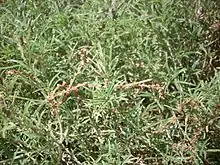| Amaranthus muricatus | |
|---|---|
 | |
| Scientific classification | |
| Kingdom: | Plantae |
| Clade: | Tracheophytes |
| Clade: | Angiosperms |
| Clade: | Eudicots |
| Order: | Caryophyllales |
| Family: | Amaranthaceae |
| Genus: | Amaranthus |
| Species: | A. muricatus |
| Binomial name | |
| Amaranthus muricatus | |
| Synonyms[2] | |
| |
Amaranthus muricatus, the so-called African amaranth, is a species in the genus Amaranthus native to South America; Bolivia, Paraguay, Argentina and Uruguay. It is an invasive species in Africa, Europe and Australia, and to a lesser degree in North America and Asia.[2] It is a decumbent perennial that does well in arid climates.[3]
A. muricatus may grow to about 60 cm tall. Its glabrous leaves are linear to lanceolate, about 2-5 cm long, with long petioles.[4] Small flowers are produced on compact, pyramidal panicles.[5] These flowers, which appear in summer and fall, produce wrinkled achenes, about 2 mm long, containing semiglossy, black, lenticular seeds that are typically 1-1.2 mm in diameter.[6][7]
References
- ↑ Bol. Acad. Nac. Ci. Republ. Argent. 4: 421 (1881)
- 1 2 "Amaranthus muricatus (Gillies ex Moq.) Hieron". Plants of the World Online. Board of Trustees of the Royal Botanic Gardens, Kew. 2017. Retrieved 18 September 2020.
- ↑ Escudero, N.L.; Albarracín, G.; Fernández, S.; De Arellano, L.M.; Mucciarelli, S. (1999). "Nutrient and antinutrient composition of Amaranthus muricatus" (PDF). Plant Foods for Human Nutrition. 54 (4): 327–336. doi:10.1023/A:1008149721435. PMID 10798343. S2CID 18987386. Retrieved 18 September 2020.
- ↑ Mifsud, Stephen (2002-08-23). "Amaranthus muricatus (African Amaranth): MaltaWildPlants.com - the online Flora of the Maltese Islands". www.maltawildplants.com. Retrieved 2021-04-29.
- ↑ "Amaranthus muricatus in Global Plants on JSTOR". plants.jstor.org. Retrieved 2021-04-29.
- ↑ "Amaranthys muricatus: Rough-fruited Amaranth". National Biodiversity Network Atlas. Retrieved April 29, 2021.
- ↑ "Amaranthus muricatus (Gillies ex Moq.) Hieron". floraofgibraltar.myspecies.info. Retrieved 2021-04-29.
This article is issued from Wikipedia. The text is licensed under Creative Commons - Attribution - Sharealike. Additional terms may apply for the media files.